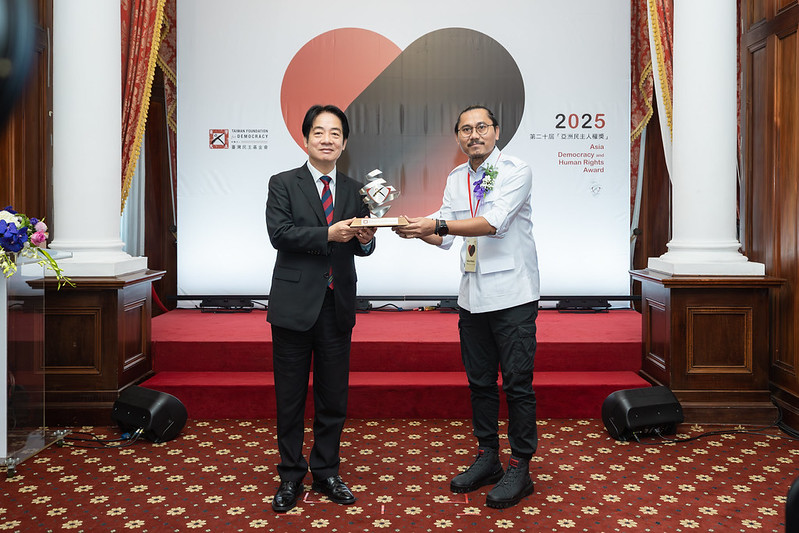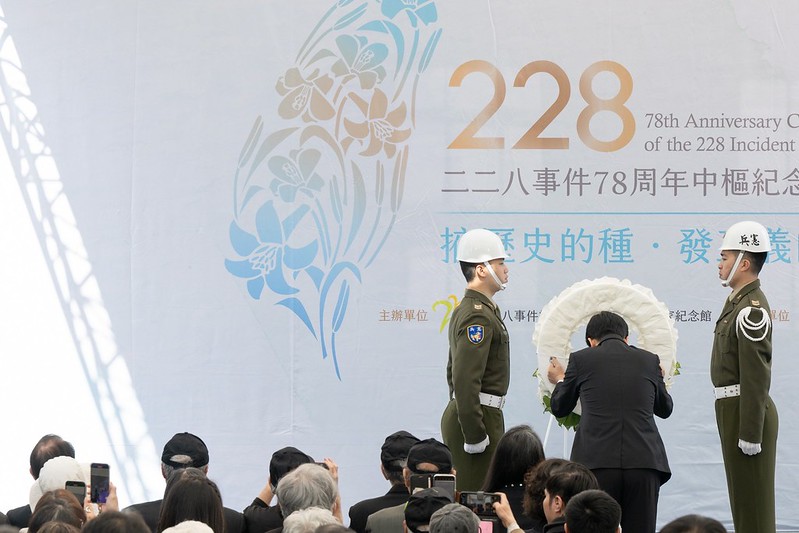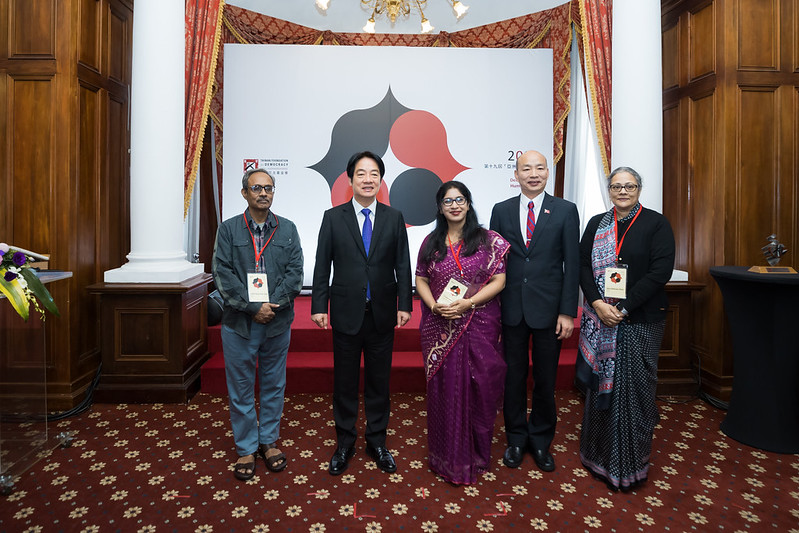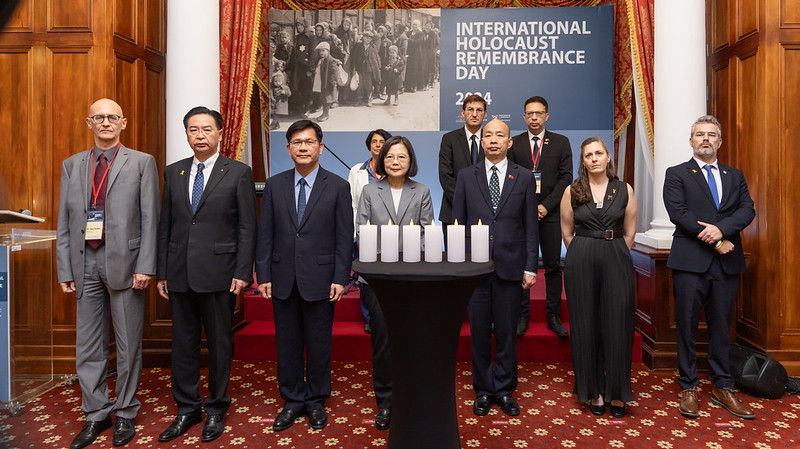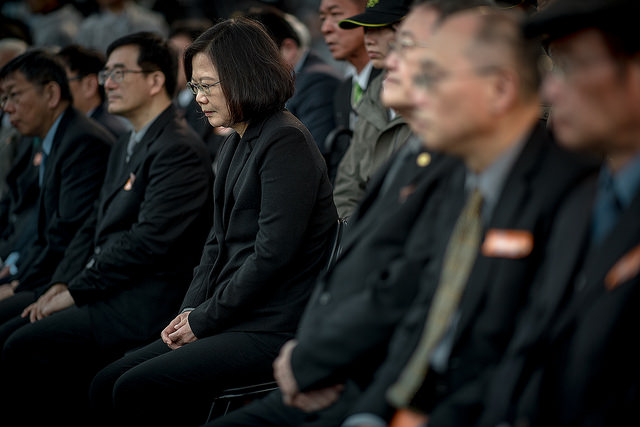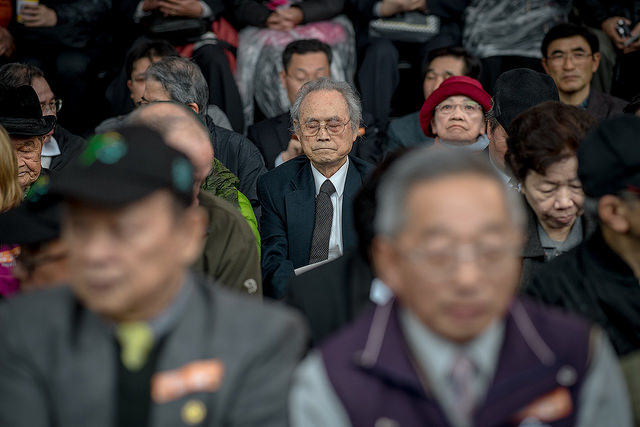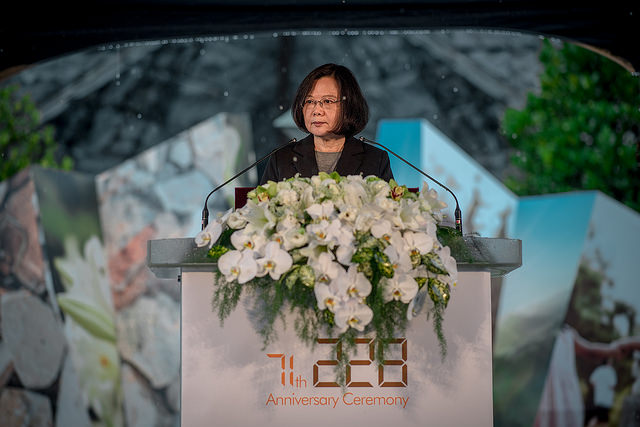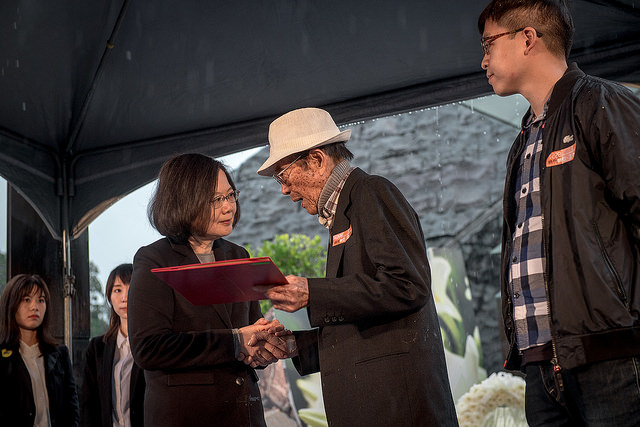News & activities
 News releases
News releases
President Tsai Ing-wen attended the nation's main memorial ceremony to mark the 71st anniversary of the 228 Incident on the afternoon of February 28. In addition to presenting flowers to show respect for the victims, the president emphasized that an act promoting transitional justice has already become law. Our purpose in pursuing transitional justice, she said, is to help make Taiwan a more free and democratic country with more human rights that is moving forward to embrace reconciliation and unity.
The following is a translation of President Tsai's remarks:
Today marks the 71st anniversary of the 228 Incident. We are gathered here once again, but this year's ceremony is special, because it marks the first 228 commemoration following the passage of the act promoting transitional justice.
We've travelled a long and difficult road. I still remember that one year ago today, right here, I made a commitment to the family of historian Dr. Chang Yen-hsien (張炎憲) and the people of Taiwan. I pledged that we would continue the task that Dr. Chang was unable to complete.
Ladies and gentlemen, now that an act promoting transitional justice has been passed, our wait is almost over. Promoting transitional justice in our homeland shows the value of transferring power between political parties.
Even today, 71 years later, we're still discovering fresh truths about the 228 Incident. Thanks to the National Archives Administration, Academia Sinica, and the 228 Memorial Foundation, over the past year we've found over a thousand possible victims in government records.
I want everyone here to rest assured that we'll examine each individual case, clarify the facts and determine the historical truth. The government will act in good faith, and where justified, make every effort to make reparations and restore reputations.
Following the passage of an act promoting transitional justice, the transitional justice promotion committee will soon formally begin operations.
I hope the committee will make every effort to unearth political case files, bring them to the light of day, and let history speak for itself.
But this task entails more than just collecting and sorting national archives and making them public. I hope the committee will also do its best to collect records about any political party and its affiliated organizations related to activities from the authoritarian past.
Anyone who has intentionally destroyed records determined to belong to any organization affiliated with a political party will be held legally responsible.
I also hope the future transitional justice committee will form a team as soon as possible to draft a national transitional justice report. Many countries have issued similar fact-finding reports. My expectations are simple. Taiwan's transitional justice report has to meet international standards.
I hope that report will also include a special section devoted to clarifying the truth and determining responsibility for the 228 Incident.
If investigations find any injustice in legal judgments from the authoritarian era, we must establish a mechanism to restore the good names of the victims.
The purpose of the fact-finding report is to conduct an institutional review of systemic infringement from the authoritarian era, and make summary recommendations. I hope that transitional justice will help make Taiwan a more free and democratic country with more human rights.
These fact-finding investigations and reviews will draw a clear red line for the current government and all future governments. Offenses that cross that line can never be allowed to recur. The greatest significance of transitional justice lies in remembering the lessons of history.
The day before yesterday, I recommended a program on my Facebook page called "After One Went Missing" (少了一個之後). The story was produced by the Hakka TV cable channel, and takes place against the backdrop of the 228 Incident.
After the 228 Incident, many families suffered because one person, or even several people, disappeared. What a painful tragedy—a family member suddenly goes missing, the truth behind their disappearance is unknown, and there's nowhere to turn for justice.
As you can imagine, it takes the people left behind a long time to adjust to the situation. And if that's just one family, what about Taiwan society as a whole, losing a whole generation of elites?
Pretending there's no pain won't make the pain go away. Facing things head-on is the only way to get a new start. That's why Taiwan needs transitional justice. Don't let sorrows of the past divide us today. We need to take proactive, practical steps to heal the collective wounds of Taiwan society.
History also plays a major role in "A Taxi Driver," a Korean movie released last year, and the story is very moving. The film takes viewers back to painful memories of the Gwangju Uprising, and gives international audiences a chance to see the Korean people reflect on their authoritarian past.
I hope that Minister of Culture Cheng Li-chiun (鄭麗君), who's with us today, will promote policies that encourage more stage productions, films, and other works with transitional justice themes, telling stories about Taiwan to Taiwanese, and the rest of the world so that everyone can see how Taiwan protects and cherishes democracy, freedom, and human rights.
I hope that in the future, when the world mentions the Taiwan Miracle, that will include not just Taiwan's economic development and transition to democracy, but also our successful experience with transitional justice.
And lastly, I want to share a story. In November last year, the family of Dr. Chang Chi-lang (張七郎), a victim of the 228 Incident in Hualien County, recovered the wooden signboard bearing the name of the hospital that Dr. Chang once operated. The signboard was delivered during a moving memorial service held at Fenglin Presbyterian Church for Dr. Chang and his two sons.
Returning that signboard was a symbol that the justice, dignity, and hope that Taiwanese lost during the 228 Incident can also be recovered. We're grateful to the older generation, who suffered tremendous hardships. Future generations in Taiwan will always remember their courage. Our quest for transitional justice has begun. There will surely be setbacks and obstacles along the way, but Taiwan will continue to move forward and embrace reconciliation and unity. Thank you.
After concluding her speech, President Tsai personally awarded "certificates of restored reputation" to 228 victim Hsieh Yi-cheng (謝一誠) and the family members of victims Yang Ah-shou (楊阿壽), Liu Wu-cheng (劉戊成), and Liang Ah-piao (梁阿標). Also attending the ceremonies were Premier Lai Ching-te (賴清德), Minister of the Interior Yeh Jiunn-rong (葉俊榮), Minister of Culture Cheng Li-chiun, Taipei Mayor Ko Wen-je (柯文哲), and Chairman Hsueh Hua-yuan (薛化元) of the Memorial Foundation of 228, as well as 228 victims and their family members.
